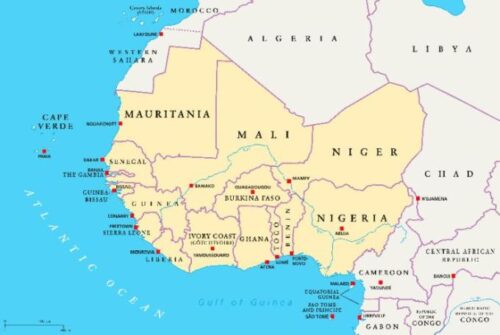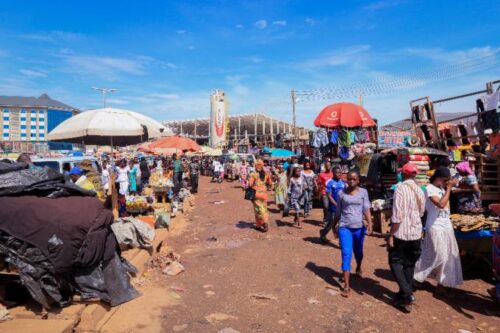Ghana. Uncertain Times.

Just a few years ago, Ghana was synonymous with development and stability. Today inflation, debt and unemployment are increasingly creating a climate of precariousness and uncertainty.
In the early years of his first term (he was elected in 2016 and re-elected in 2020), President Nana Akufo-Addo proudly announced “no more help, we can do it alone”. The fault of the crisis – citizens say – does not lie in the pandemic or the Russian-Ukrainian war, we are paying for the mismanagement of recent years. The Ghanaian dream of growth, development, entering international economies, constant contact with an outside world (starting with investors and expatriates) attracted to a lively country, rich in prospects, welcoming – that dream seems
to have come to an end.

West Africa region, political map. Area with capitals and borders. 123rf.com
The rude awakening translates into raw facts that explain the performance of a country: inflation, debt, unemployment. Eleven years have passed since 2011 when – a novelty for those who continue to want to see Africa as a continent of backwardness – Ghana was the fastest growing economy in the world. The discovery of offshore oil fields had given it a significant boost, but the reasons for the boom also lay in other ‘treasures’: the gold mines, from which the country has always drawn part of its wealth; cocoa and then precisely the specific character of the population, the basis of democratic stability and governments. The last coup dates back to 1981 and even those years – those of Jerry Rawlings – were more of construction than mere authoritarianism. The foundations were laid for that unity and respect between religions and ethnic groups that, apart from occasional tensions, characterize the country. New perspectives emerged that would have ‘ushered’ it towards the fame that still accompanies it today.
Inequalities
Now, there is change afoot at the expense of the citizens, those optimistic people who today find themselves dealing with uncertainty. First of all, in the economy. The last few months, which coincided with the easing of anti-Covid measures and the start of the Russian-Ukrainian war, have seen prices soar exorbitantly. Spending Ghana Cedi (about 13 Euro cents) to buy a single tomato at the market when you used to bring home 10 tomatoes at the same price, gives the measure of a surge that among other things concerns all basic necessities, including bread. So much so that today the country is considered among the most expensive in the world. In November, inflation was almost 37%. Not to mention the depreciation of the local currency. The Ghana cedi has depreciated by over 50% this year and is listed as the world’s worst-performing currency against the US dollar.

President of Ghana, Nana Addo Dankwa Akufo-Addo. CC BY 2.0/Graham Carlow
The Ghanaians have been complaining for years about the marginalization of social classes which should instead receive more attention from the public administration. Yet it is they who have sacrificed most. Bills for drinking water and electricity have sky-rocketed. And new taxes, such as the e-levy, have been introduced on digital transactions. Meanwhile, the debt is growing, which amounts to over 80% of GDP. Ghana is also negotiating a $3 billion IMF bailout programme.
The country had attracted a lot of money in recent years: in 2020 there was $ 2.65 billion in foreign direct investment, the highest amount in West Africa, with the building and construction sectors playing the part of the giant. And in fact, it is all a swarm of construction sites,
new roads, and skyscrapers.
But investments are concentrated in Accra where the per capita economic output is three times that of the national average.

Busy Street near the Ghana Central Market in Kumasi. 123rf.com
In the first six months of 2021 alone, it attracted 78.69% of all investment projects. This capital has become one of the most expensive African cities to live in. Less affected by this ferment are the suburbs, which lack essential services, starting with sanitation and sewage, or worse still the slums, rural areas, and other regions of the country. It is these places that show the measure of disparity between citizens. The upper middle class has grown considerably in recent years as has the power of the political and institutional world. It is due to this power – as well as the positive reputation of the country – that Accra has secured some important presences. Starting with the secretariat of the African Continental Free Trade Area (AfCFTA), Google which opened its first artificial intelligence centre in Africa in the Ghanaian capital and Twitter, again the first African office. These great successes were claimed by Nana Akufo-Addo who, after being elected in 2016, was reconfirmed in 2020. This growth, which however continues, has not yet turned into greater social equity. (Open Photo: 123rf.com)
(A.S.)



